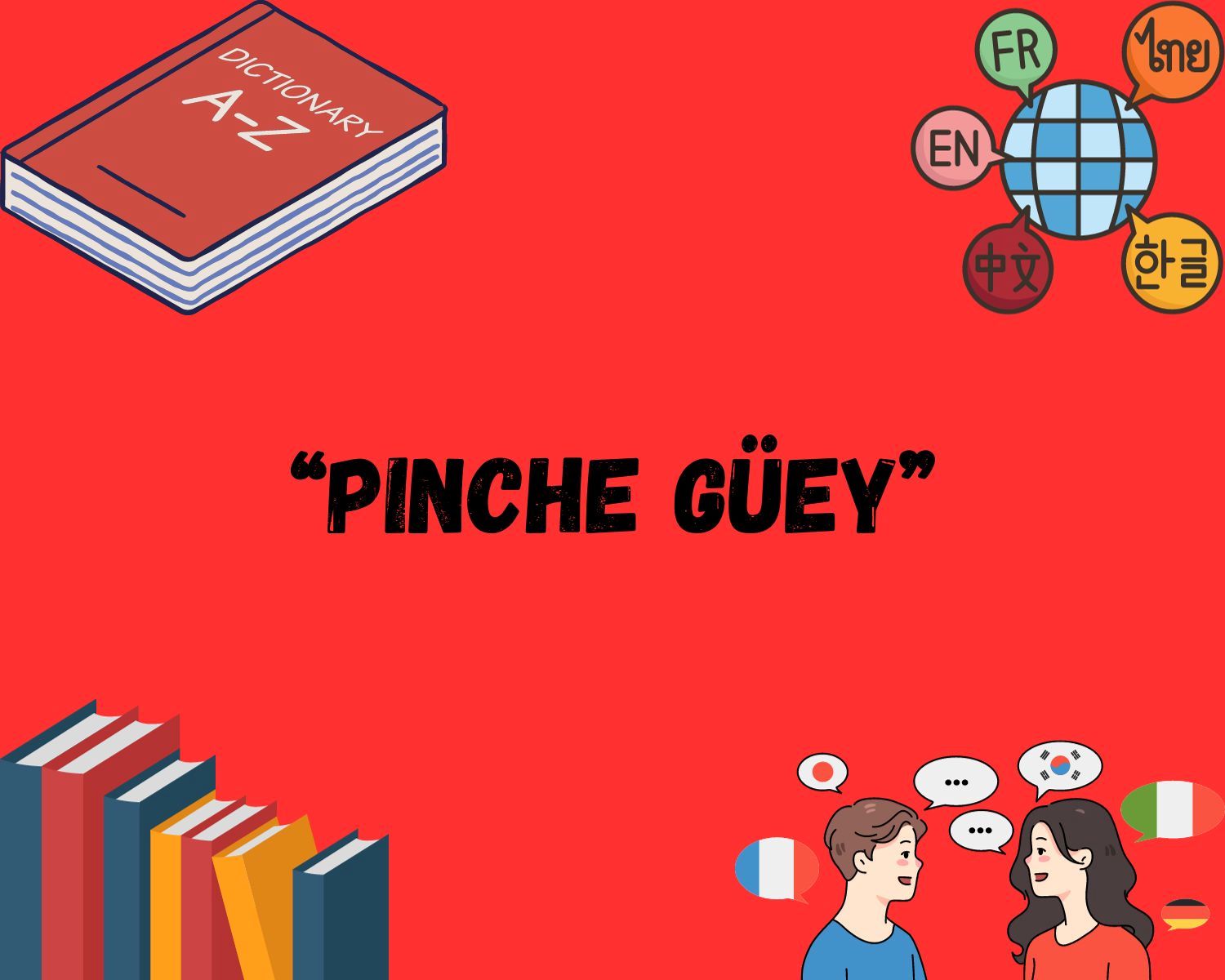Home>Language and Grammar>The Surprising Reason Mexicans Always Say “Mande”


Language and Grammar
The Surprising Reason Mexicans Always Say “Mande”
Published: February 19, 2024
Discover the cultural significance behind the Mexican phrase "Mande" and its impact on language and grammar. Explore the surprising reasons Mexicans always use this expression.
(Many of the links in this article redirect to a specific reviewed product. Your purchase of these products through affiliate links helps to generate commission for Regretless.com, at no extra cost. Learn more)
Table of Contents
Introduction
Have you ever wondered why Mexicans always say "Mande" when they didn't hear or understand something? This seemingly simple word holds a fascinating cultural significance deeply rooted in Mexican history and tradition. In this article, we will delve into the historical origins, evolution, and modern usage of the word "Mande," uncovering the surprising reasons behind its prevalence in Mexican culture.
The word "Mande" goes beyond a mere expression of politeness or a request for clarification. It reflects the rich tapestry of Mexican customs, language, and social interactions. By exploring the multifaceted layers of "Mande," we can gain a deeper understanding of the values and dynamics that shape Mexican society. Let's embark on a journey to unravel the enigmatic allure of this ubiquitous term and discover the profound insights it offers into Mexican culture.
The Cultural Significance of "Mande"
The word "Mande" holds a profound cultural significance in Mexican society, transcending its literal meaning of "pardon?" or "please repeat." It serves as a linguistic embodiment of respect, humility, and interconnectedness deeply ingrained in Mexican customs. When a Mexican utters "Mande," it reflects not just a request for clarification, but a manifestation of deference towards the speaker. This simple yet powerful word encapsulates the essence of Mexican interpersonal dynamics, emphasizing the importance of courtesy and consideration in communication.
In Mexican culture, the use of "Mande" extends beyond mere politeness; it symbolizes a fundamental value placed on acknowledging and honoring others. By employing this term, individuals express their willingness to yield to the speaker's authority, recognizing their wisdom and knowledge. This act of deference fosters a sense of harmony and mutual respect within social interactions, reflecting the deeply rooted communal ethos prevalent in Mexican society.
Furthermore, "Mande" embodies the concept of interconnectedness, emphasizing the interconnected nature of human relationships. By uttering this word, individuals acknowledge their reliance on others for information and guidance, reinforcing the communal fabric that binds Mexican communities together. This interconnectedness is a cornerstone of Mexican culture, emphasizing the interdependence and solidarity that underpin social structures.
Moreover, the cultural significance of "Mande" extends to the realm of familial and societal hierarchies. When used in familial settings, it reflects the deference and obedience children show towards their elders, reinforcing the importance of respecting authority and wisdom within the family unit. In broader societal contexts, "Mande" underscores the deference shown towards individuals in positions of authority, reflecting the hierarchical dynamics prevalent in Mexican social structures.
In essence, the cultural significance of "Mande" transcends its linguistic function, embodying the values of respect, humility, interconnectedness, and deference deeply ingrained in Mexican culture. This seemingly simple word serves as a poignant reflection of the intricate tapestry of customs, values, and social dynamics that define Mexican society, offering profound insights into the cultural ethos of this vibrant and diverse nation.
Historical Origins of the Phrase
The phrase "Mande" traces its historical origins to the complex interweaving of indigenous, colonial, and contemporary influences that have shaped Mexican culture. Its roots can be traced back to the era of Spanish colonization in Mexico, where the convergence of Spanish and indigenous languages gave rise to a distinct linguistic fusion.
During the colonial period, the Spanish language permeated Mexican society, becoming the dominant linguistic force. However, the imposition of Spanish did not eradicate the indigenous languages spoken by the native populations. Instead, it led to a linguistic symbiosis, resulting in the emergence of a hybrid language known as "Mexican Spanish." This linguistic amalgamation incorporated elements of indigenous languages, including Nahuatl, into the Spanish spoken in Mexico.
Within this linguistic tapestry, the term "Mande" found its place as a manifestation of the blending of Spanish and indigenous linguistic conventions. The term itself is derived from the Spanish verb "mandar," meaning "to command" or "to order." However, its usage in Mexican Spanish transcends its literal translation, embodying a nuanced cultural significance deeply rooted in indigenous customs and social hierarchies.
Furthermore, the historical origins of "Mande" are intricately linked to the hierarchical structures prevalent in pre-colonial indigenous societies. In many indigenous cultures, deference to authority figures and elders was a fundamental aspect of social interactions. The use of "Mande" reflects this tradition of deference, echoing the reverence for authority and wisdom ingrained in indigenous customs.
Moreover, the historical origins of "Mande" also reflect the enduring resilience of indigenous languages and customs in the face of colonial dominance. Despite the imposition of Spanish, indigenous languages and cultural practices persisted, leaving an indelible imprint on the linguistic and cultural landscape of Mexico.
In essence, the historical origins of the phrase "Mande" are deeply intertwined with the complex historical forces that have shaped Mexican culture. Its evolution from a linguistic fusion during the colonial era to a cultural emblem of deference and interconnectedness underscores the enduring legacy of indigenous influences and the dynamic interplay of historical forces in shaping the linguistic and cultural tapestry of Mexico.
The Evolution of "Mande" in Mexican Culture
The evolution of the term "Mande" in Mexican culture reflects a dynamic interplay of historical, linguistic, and societal forces that have shaped its multifaceted significance. From its origins as a linguistic fusion during the colonial era to its contemporary usage as a cultural emblem, "Mande" has undergone a remarkable transformation, embodying the enduring resilience of indigenous influences and the complexities of Mexican social dynamics.
During the colonial period, the Spanish language permeated Mexican society, leading to the emergence of Mexican Spanish, a hybrid language that incorporated elements of indigenous languages. Within this linguistic fusion, "Mande" evolved as a manifestation of the blending of Spanish and indigenous linguistic conventions, reflecting the enduring legacy of indigenous influences in Mexican culture.
As Mexican society evolved, "Mande" transcended its linguistic function, assuming a broader cultural significance deeply rooted in Mexican customs and social interactions. It became emblematic of respect, humility, and interconnectedness, embodying the values of deference and communal ethos prevalent in Mexican society. The use of "Mande" extended beyond mere politeness, symbolizing a fundamental reverence for authority and wisdom, fostering a sense of harmony and mutual respect within social interactions.
Furthermore, the evolution of "Mande" reflects the enduring resilience of indigenous languages and customs in the face of colonial dominance. Despite the imposition of Spanish, indigenous influences persisted, leaving an indelible imprint on the linguistic and cultural landscape of Mexico. This resilience underscores the dynamic interplay of historical and cultural forces that have shaped the evolution of "Mande" in Mexican culture.
In contemporary Mexican society, "Mande" continues to serve as a poignant reflection of the intricate tapestry of customs, values, and social dynamics that define Mexican culture. Its evolution from a linguistic fusion to a cultural emblem underscores the enduring legacy of indigenous influences and the dynamic interplay of historical and societal forces in shaping the linguistic and cultural tapestry of Mexico.
The evolution of "Mande" in Mexican culture stands as a testament to the enduring resilience of indigenous influences and the complexities of Mexican social dynamics, offering profound insights into the cultural ethos of this vibrant and diverse nation.
Modern Usage and Interpretations
In contemporary Mexican society, the phrase "Mande" continues to permeate everyday interactions, serving as a linguistic and cultural hallmark that reflects the enduring values and customs of Mexican culture. Its modern usage and interpretations offer a window into the intricate dynamics of Mexican social interactions and the profound significance ascribed to this seemingly simple word.
The modern usage of "Mande" transcends its literal meaning of "pardon?" or "please repeat," encompassing a spectrum of interpretations that underscore its cultural resonance. When uttered in response to a request or directive, "Mande" embodies a spirit of deference and willingness to comply, reflecting the deeply ingrained value of respect for authority and communal harmony. In this context, it serves as a subtle yet powerful affirmation of the interconnectedness and deferential ethos prevalent in Mexican social interactions.
Moreover, the interpretations of "Mande" extend beyond its linguistic function, encapsulating broader cultural nuances and social dynamics. When used in familial settings, "Mande" reflects the reverence for familial hierarchies and the importance of filial piety, underscoring the deference shown towards elders and authority figures within the family unit. This usage echoes the enduring traditions of respect and obedience deeply embedded in Mexican familial customs, emphasizing the interconnectedness and solidarity that bind families together.
Furthermore, the interpretation of "Mande" in societal contexts reflects the deference and respect accorded to individuals in positions of authority, be it in professional settings, educational institutions, or public spaces. Its usage conveys a profound acknowledgment of the wisdom and expertise held by those in authoritative roles, fostering a culture of mutual respect and harmonious interactions within societal structures.
In contemporary Mexican culture, "Mande" serves as a linguistic bridge that connects the past with the present, embodying the enduring values of respect, humility, and interconnectedness that define Mexican society. Its modern usage and interpretations offer a poignant reflection of the intricate tapestry of customs, values, and social dynamics that shape Mexican culture, underscoring the profound insights it provides into the cultural ethos of this vibrant and diverse nation.
The modern usage and interpretations of "Mande" stand as a testament to the enduring relevance of this seemingly simple word in capturing the essence of Mexican social interactions and the enduring values that underpin the rich tapestry of Mexican culture.
Conclusion
In conclusion, the enigmatic word "Mande" encapsulates the profound cultural significance deeply ingrained in Mexican society. Its historical origins, evolution, and modern usage offer a compelling narrative that unravels the intricate tapestry of customs, values, and social dynamics that define Mexican culture. From its roots as a linguistic fusion during the colonial era to its contemporary usage as a cultural emblem, "Mande" serves as a poignant reflection of the enduring resilience of indigenous influences and the complexities of Mexican social interactions.
The cultural significance of "Mande" extends far beyond its literal meaning, embodying the values of respect, humility, interconnectedness, and deference deeply ingrained in Mexican customs. It symbolizes a fundamental reverence for authority and wisdom, fostering a sense of harmony and mutual respect within social interactions. The phrase reflects the interconnected nature of human relationships, emphasizing the importance of acknowledging and honoring others, and underscores the enduring traditions of respect and obedience deeply embedded in Mexican familial customs.
Furthermore, the historical origins of "Mande" are intricately linked to the hierarchical structures prevalent in pre-colonial indigenous societies, reflecting the enduring legacy of indigenous influences in Mexican culture. Its evolution from a linguistic fusion to a cultural emblem underscores the enduring resilience of indigenous influences and the dynamic interplay of historical and societal forces in shaping the linguistic and cultural tapestry of Mexico.
In contemporary Mexican society, "Mande" continues to serve as a linguistic and cultural hallmark, offering a window into the intricate dynamics of Mexican social interactions and the profound significance ascribed to this seemingly simple word. Its modern usage and interpretations reflect the enduring values of respect, humility, and interconnectedness that define Mexican society, underscoring the profound insights it provides into the cultural ethos of this vibrant and diverse nation.
In essence, the word "Mande" stands as a testament to the enduring relevance of this seemingly simple word in capturing the essence of Mexican social interactions and the enduring values that underpin the rich tapestry of Mexican culture. Its cultural significance serves as a poignant reminder of the deep-rooted customs and values that continue to shape and define Mexican society, offering profound insights into the cultural ethos of this vibrant and diverse nation.














